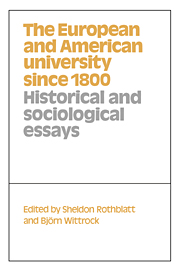Book contents
- Frontmatter
- Contents
- Notes on the contributors
- Introduction: universities and ‘higher education’
- Part I Fact and ideals in liberal education
- Part 2 The State, the university, and the professions
- Part 3 The ambiguities of university research in Sweden and the United States
- Part 4 Complexity
- 7 The problem of complexity in modern higher education
- 8 Comparative perspectives on British and American higher education
- Part 5 The ironies of university history
- Index
7 - The problem of complexity in modern higher education
Published online by Cambridge University Press: 04 August 2010
- Frontmatter
- Contents
- Notes on the contributors
- Introduction: universities and ‘higher education’
- Part I Fact and ideals in liberal education
- Part 2 The State, the university, and the professions
- Part 3 The ambiguities of university research in Sweden and the United States
- Part 4 Complexity
- 7 The problem of complexity in modern higher education
- 8 Comparative perspectives on British and American higher education
- Part 5 The ironies of university history
- Index
Summary
The base similarity of modern systems of higher education is that they become more complex. To cope with the unrelenting pressures of complexity, national systems adjust their historic configurations of beliefs, interests, and structures. Hence, to pursue the very nature of this fundamental academic trend, to suggest its more important causes, and especially to seek its compelling effects, is to explore basic modes of evolution. Among the modes of adaptation, we undoubtedly will find some impressive cross-national similarities. But close analysis will surely also reveal large differences that follow from unique national traditions. Guided by the response sets of established orders, nations must necessarily cope with complexity in somewhat different ways. Any theory of convergence that highlights a common drift into complexity, and similar forms of accommodation, will need in time to shade into a theory of divergence that observes individualised national evolutions. In this early analysis, particularly to establish some opening categories, I will concentrate on what seems everywhere operative.
The forces of complexity
With each passing decade a modern or modernising system of higher education is expected and inspired to do more for other portions of society, organised and unorganised, from strengthening the economy and invigorating government to developing individual talents and personalities and aiding the pursuit of happiness. We also ask that this sector of society do more in its own behalf in fulfilling such grand and expanding missions as conserving the cultural heritage and producing knowledge. This steady accretion of realistic expectations cannot be stopped, let alone reversed. Where among modern nations can we expect a return to the education of a relatively homogeneous 3 to 5 per cent of the age group?
- Type
- Chapter
- Information
- The European and American University since 1800 , pp. 263 - 279Publisher: Cambridge University PressPrint publication year: 1993
- 12
- Cited by



